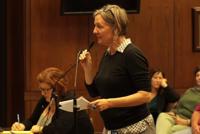
Anne Rolfes is director of the Louisiana Bucket Brigade.
A state court has vacated a permit for a liquefied natural gas export facility in Cameron Parish, concluding that state regulators failed in their duties to consider the project’s effect on low-income communities and climate change.
Judge Penelope Q. Richard of the 38th Judicial District Court sided the plaintiffs – the Sierra Club, Louisiana Bucket Brigade and Turtle Island Restoration Network – on two of their arguments in her Oct. 10 opinion. Rejecting the environmentalists’ third argument, Richard found that the Louisiana Department of Energy and Natural Resources (LDENR) Office of Coastal Management (OCM) was not required to weigh public safety risks from the Commonwealth LNG project, since those are largely the purview of the federal government.
Louisiana LNG export terminals have been the target of environmental litigation in recent years. The Commonwealth LNG project would be the third such facility in this section of the Calcasieu River if it eventually wins approval.
The state Attorney General’s Office said the district court would not have the last word on the LNG permit debate.
“We are appealing and I’m confident the ruling will be reversed because it overreads the jurisprudence and the state constitution, and it ignores the actual facts in the record,” Attorney General Liz Murrill said in a statement emailed to the Louisiana Record. “FERC (Federal Energy Regulatory Commission) did the right thing, and we are grateful to have time to clear this matter up.”
Richard acknowledged that FERC was involved in the evaluation of a conditional use permit (CUP) for the project and that the agency’s Final Environmental Impact Statement (FEIS) found there “would be no cumulative impacts to cultural resources and soils and a negligible contribution to cumulative impacts on groundwater or geological resources such as subsidence, erosion, flooding and mineral resources.”
The project, however, will also have an effect on surface water, tourism, traffic, noise and pollution and may negatively affect environmental justice communities in the region, including those who live in poverty and fish for their livelihood, the court found.
“The FEIS also noted that recreational and commercial fisheries in the ship channel may be impacted by the loss of available fishing areas and the operation of marine facilities and LNG carrier traffic,” Richard said.
The state agency failed to consider the consequences of the LNG project on climate-related issues in coastal Louisiana and to consider the impact on low-income communities when it issued its 66-page decision approving the project, according to the court’s opinion.
“Based on the OCM’s failure to consider these two issues, the court hereby remands this case to the OCM, for further proceedings, as may be appropriate,” Richard said. “The coastal use permit will be vacated until such time that the OCM has considered these issues in issuing the CUP to Commonwealth and makes a finding that the benefits of this project outweigh the costs to the community.”
If completed, the Commonwealth LNG project would result in the destruction of 75 acres of wetlands in the Calcesieu Pass area, according to the Sierra Club. Annual energy exports from the facility would generate greenhouse gases equal to 13 million new gasoline-fueled vehicles, the environmental group reported.
“Like the rest of the gas export industry, Commonwealth would be a polluting disaster that would destroy fragile fishing areas and further decimate fishing families in southwest Louisiana,” Anne Rolfes, director of the Louisiana Bucket Brigade, said in a prepared statement. “ It should never have been permitted. We hope this ruling shakes Louisiana to its senses.”






